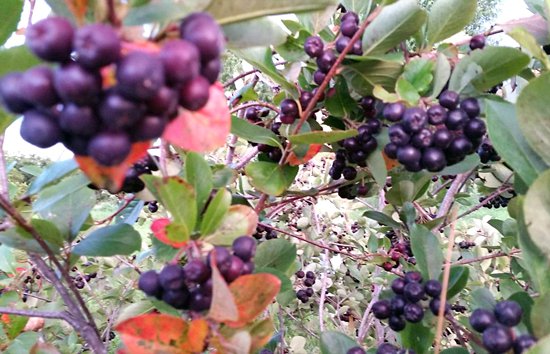BLANCHARDVILLE — Roberta Barham was drinking cranberry juice made from frozen concentrate when she noticed a different flavor — one more tart and robust than usual.
When she checked the label, it was the first time she had heard of the aronia berry.
About two months later, Roberta and her husband Kim, received information from the Dane County Farmers’ Market mailing list about Carandale Fruit Farm, where they grow a variety of fruit, including aronia berries.
“The more I learned about it, the more excited I got,” Roberta said.
Roberta wanted to buy 500 plants to get started — Kim wanted to buy 1,000, and that’s what they did. They planted their crop and had to wait three years to see what kind of yield they would get. In 2012, they had a first harvest of more than 600 pounds.
When the Barhams first moved to their farm outside of Blanchardville in 2002, Roberta told herself she didn’t want to do anything commercial. With little to do, Barham said she was getting more and more depressed. While taking a walk around the farm on a dreary day, her eyes were caught by some bittersweet wildflowers. It was the second time they had snapped her out of her funk.
“I said to myself, ‘Look, there’s beauty even in the darkest days,’” Roberta said.


Those moments are what inspired Roberta to start selling commercial cut flowers to a business in Madison. Now, she no longer cuts flowers. She shifted her entire focus to aronia berries.
The Barhams now average about 1,200 pounds of hand picked berries each year and collaborate with Bellbrook Berry Farm in Brooklyn. The Barhams’ farm is certified organic. The plants begin to flower in May, set for early June and mature in late August. They then have two weeks to harvest. Once the berries are cleaned, they make their way to stores by Labor Day.
When they first started, the Barhams sold aronia berries to stores in Chicago, but now mostly just sell locally. After harvest, the berries can be found at Woodman’s, Hy-Vee and the Dane County Farmers’ Market.
Roberta said she likes the berries for more than just their taste — they also have a wide range of health benefits such as high antioxidants, lower cholesterol and improve gut and urinary health. They’re also anti-diabetic. Past studies have linked their consumption to improved insulin production. The berry also has been proven to best retain its nutritional value under heat.
I said to myself, ‘Look, there’s beauty even in the darkest days.'Roberta Barham
Although the berry is native to North America, Roberta said the reason it isn’t more widely consumed is that a lot of people don’t know about it.
Although research shows aronia berries pack a more nutritional punch than cranberries and blueberries, the Midwest Aronia Association, which the Barhams are a part of, want more studies done to back it up. To do this, however, the berries have to be more heavily marketed.
In May, Barham Gardens was given the Buy Local, Buy Wisconsin grant by the Wisconsin Department of Agriculture, Trade and Consumer Protection to “promote and highlight aronia product, distribution, sales and the aronia industry.”
The Barhams educate people about aronia berries any chance they get.
“It’s a battle sometimes it feels,” Roberta said. “But to me it’s one worth fighting.”
Most of the education is focused on the best ways for people to consume the berries. Roberta said a lot of people like to make smoothies with them because the milk offsets the tannins, which cause a drying sensation in the mouth.


In the off season, the Barhams work on getting the word out about aronia berries by marketing their aronia and cherry liqueur made by Yahara Bay Distillers of Madison.
When Roberta was on the Midwest Aronia Association board, she spearheaded the creation of the Aronia Berry Recipes cookbook, where members put together 90 recipes. The cookbook is available on Amazon.
After harvest, the Barhams like to invite people to the farm for tastings and encourage them to bring their own aronia berry creations.
Both retired, the Barhams don’t mind keeping busy farming their berries.
“It gives you something to worry about,” Kim said.
Roberta doesn’t see the berries as just a hobby.
“They say people live longer when they have something to do,” Roberta said. “That they’re passionate about.”





